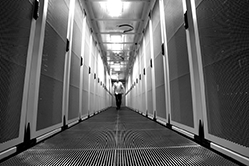Blog posts tagged hosting
Why PRISM means your hosting location matters

Millions of businesses rely on cloud technology each day, and recent revelations about PRISM have thrown data security back into the spotlight, demonstrating that where your data is physically located can really matter.
Where's the cloud?
Over the last five years or so more and more companies have started moving business data to the cloud. But while the benefits of the technology are clear, the implications are often not.
In truth, cloud technology can present some real challenges. Not enough companies are giving thought to the legal and physical implications of the cloud. I believe cloud providers have a responsibility to highlight these factors, of which location is one.
Location, location, location
|
It's widely accepted that companies should hold data in a secure facility (usually a building called a data centre, constructed specifically for the purpose). The location of that facility often get overlooked, but it matters.
For starters, some regions are prone to natural events such as earthquakes or floods. Others are beset by political instability and unrest.
The Euro crisis has hit confidence in some European countries which were previously considered rock-solid.
And then there's growing interference by governments - yes, we're back to PRISM again.
In light of these concerns, you're well-advised to investigate the setting of any potential cloud provider's facilities.
Where is right for you?
When evaluating the location of a cloud provider or hosting firm, these are the main factors to consider:
- Environmental risk. For instance, is the area prone to earthquakes or flooding?
- Political stability. Can you be confident the business environment won't change?
- An efficient legal system. If something goes wrong, you want a framework that makes it easy to seek redress.
- Low crime and corruption. You can be more confident about your data safety.
- Respect for confidentiality. After all, your business data is likely to be sensitive.
Staying competitive
Not only do you need to keep your data secure, but you also need to maintain a competitive edge.
Cloud services give you extra flexibility and make it easy for you to work on the move, but location plays a part in competitiveness too.
For instance, server response times can vary significantly depending on whether your servers are located relatively nearby (the same country or continent), or further afield (like the other side of the world).
This can have a very real influence on your website's search rankings, because load speed is one of the factors Google takes into account.
These are just some of the reasons your business should pay attention to the location of servers holding your data. Have you give it much thought?
Mateo Meier is founder of Artmotion, which offers hosting services located in Switzerland.
Could you survive a denial of service attack?
Distributed denial of service attack. DDoS for short. Four letters that are can strike terror into the heart of anyone who's been on the receiving end of one.
Overwhelming a website
DDoS attacks aim to take websites offline by overwhelming them with requests for information. Typically, they involve hundreds or thousands of computers, all coordinated to bombard the site simultaneously.
Often, the owners of these computers don't even know what's going on, because the source of the attack is malware that's infected their machines.
DDoS attacks have hit the news regularly in 2012. Last month, Teresa May and the Home Office were targeted. Back in May, Webfusion - one of the UK's largest web hosts - was on the receiving end of a sustained attack (the firm produced an interesting white paper explaining what happened).
Other victims have included Virgin Media, WikiLeaks, HSBC and Amazon.
DDoS - not just big brands
The motives for DDoS attacks vary. Sometimes they're random. Sometimes they're political. But there's often a financial aspect. They can come from your competitors, or they can be blackmail, pure and simple. Pay up, or your website stays offline.
And although it's only big name brands that hit the news, online criminals are increasingly turning their attention to smaller companies. Without the resources to deflect attacks, they're softer targets.
As security expert Don Smith told us recently:
"More and more smaller companies are being attacked by cyber criminals, yet many still hold the view that they are too small to be targeted."
Web hosting and DDoS
If you're not prepared, combating a DDoS attack can be tricky. When your website's overwhelmed by spurious traffic, you may find you're unable to even log in yourself.
In fact, the possibility of a DDoS attack is something you should consider when choosing a web host, because the way they handle them can vary remarkably.
Get the right hosting
Some hosting companies will simply take your website offline completely so that their other customers aren't affected. Worse, you might get a bill for the extra traffic the attack generated.
Other web hosts will provide far more constructive assistance. Ask if they can give you examples of how they've fended off attacks in the past, and look for security features that come as part of your package, like DDoS protection.
Also make sure they keep their servers and apps up-to-date, because often the latest versions of ecommerce and content management tools are more resistant to DDoS attacks.
Looking for a new web hosting firm?Here are some firms you might like to consider: |
Have you ever suffered a DDoS attack? How did you cope?
Should you move to a data centre?
 Your business needs to maintain a reliable backup of digital data, like your customer database, documents, images, emails, accounts and so on.
Your business needs to maintain a reliable backup of digital data, like your customer database, documents, images, emails, accounts and so on.
That data is mission critical, so it all has to be kept safe from theft, fire, flood or accidental deletion. If you run a smaller company, it’s likely your data is stored on a simple server in the office.
What happens as your business grows?
As demand grows for your company’s products or services, you’ll collect more data. As a result, you inevitably end up needing more than a single server. Eventually, you end up with a whole room of the things. This brings new demands and costs:
- You need air conditioning, because lots of servers create lots of heat. If you don’t keep them cool they can fail catastrophically. Providing cooling using traditional air-conditioning units can be very expensive.
- You need an IT professional to make sure your servers keep running reliably. For 24/7 cover you’ll probably need more than one person.
These requirements can become a major financial, logistical and security headache.
Moving to a data centre
A common solution to these problems is to use a purpose-built data centre. Maintained by network specialists, mechanical experts and electrical engineers, a data centre is a secure, computer-friendly environment run at the perfect temperature for the servers inside.
From a security perspective, data centres are also equipped with their own backup power supply. This is usually an uninterruptable power supply (UPS), a large bank of batteries plus a generator to ensure power is always available.
Data centres also usually have direct connections into major internet links – also called the ‘internet backbone’ – meaning connectivity is fast and reliable.
Businesses usually put their servers into a data centre that’s shared with other organisations. This is known as colocation.
What does a data centre look like?
The image above is of a typical data centre. They have lots of aisles between servers stacked in locked cabinets (called racks). You rent as many racks as you want and you pay according to the amount of processing power, storage space or bandwidth you use.
Many providers off both DIY and full service maintenance options, so you can maintain systems yourself or use the provider’s technical support.
There are a number of good arguments for using a data centre:
- Data can be backed up easily and securely
- The risk of data loss is significantly reduced
- Internet access is fast and reliable
- The data centre provides support round-the-clock
- Your overheads are reduced
Using a data centre also makes it easy to add extra capacity as your business grows (you just rent more space) and you don’t have to worry about having lots of servers on your premises.
- Is IT the fifth utility?
- Can the cloud make you more efficient?
- Six signs your business needs a server
David Barker is technical director and founder of 4D Data Centres, the green colocation and connectivity supplier.
eBuyer shows how the wrong web hosting can damage your business

Could your web hosting be a roadblock for your website? (Image: williac on Flickr.)
If there's a piece of business IT that's a commodity, surely it's web hosting. There are countless providers, yet what you get is basically the same, right? It's space to get your website on the internet - how much difference can there possibly be between packages?
Well, when you're trying to find reliable web hosting for your business, you might want to learn from the recent experience of eBuyer. Earlier this week the online electronics retailer demonstrated that the ability of your web hosting to handle sudden surges in visitor numbers can hugely affect customer opinions.
How a £1 sale went wrong
Perhaps in an effort to jump on the 'black Friday' and 'cyber Monday' sales which have crossed the Atlantic in recent years, the company announced its exciting £1 clearance sale: 'Every product £1 - updated hourly.' Promising items such as flatscreen monitors for just a quid, it attracted lots of attention on Facebook, Twitter and deal websites.
Unfortunately, things didn't quite go to plan. Demand from customers crashed the eBuyer website even before the sale had started, taking it offline for several hours.
Inevitably, disappointed customers vented their frustration on the company's own Facebook page, and on other sites like MoneySavingExpert.com and HotUKDeals. News stories on The Register and other tech sites followed.
It turned what should have been an attention-grabbing sale into a damage limitation exercise. Check out the apology the company posted on its website.
Was the web hosting to blame?
Let's not be too harsh on eBuyer. They're by no means the first online retailer to fall into this trap and they won't be the last. It's a classic mistake: generating massive demand for your products or services, while failing to ensure your website can cope.
Problems like this are commonly caused by poor internal communication (the marketing department sets up a promotion without briefing the technical team properly), or simply underestimating the level of demand.
The type of web hosting and the way it's set up has a crucial role to play too. Large companies like eBuyer have complex hosting systems, probably with lots of servers spread around different locations. Getting these geared up for a traffic spike can be a complex job.
Talk to the tech guys
For smaller businesses, things are usually more straightforward. You might have cheap shared hosting, some sort of cloud hosting, or maybe your own dedicated hosting.
Whatever your set up, it's important to speak to whoever manages your hosting well before you launch a promotion or start a project with the potential to create a huge increase in website traffic.
Indeed, when you first choose your web hosting, ask yourself whether this is an important requirement. Some types of hosting - notably cloud hosting - are inherently better suited to managing big spikes in demand.
One-off flash sales are a great way to gain PR and boost your customer base - but only if your website is up to the task of serving all those customers. A failure during a traffic spike is incredibly frustrating, because it takes your website down when you have most potential customers trying to view it. Just ask eBuyer.



